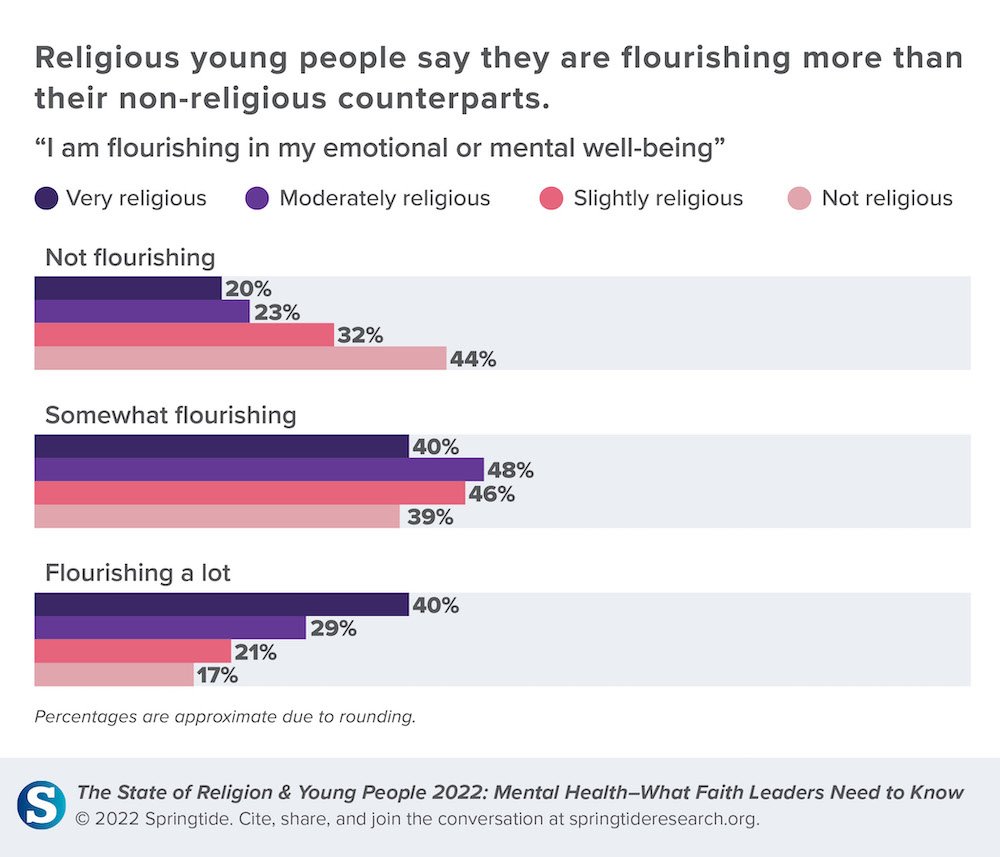Gen Zers Are Religious, And Their Mental Health Depends On It
(ANALYSIS) You’ve seen the headlines: Members of Generation Z are “shying away from religion” and “losing their religion.” One prominent religious demographer wrote that with Gen Z, “we have a picture of a rapidly secularizing America that will significantly alter the culture and politics of the United States for generations to come.”
At the same time, Gen Z is in the midst of a mental health crisis. U.S. Surgeon General Vivek Murthy recently warned, “Even before the pandemic, an alarming number of young people struggled with feelings of helplessness, depression, and thoughts of suicide,” adding, “The COVID-19 pandemic further altered their experiences at home, school, and in the community, and the effect on their mental health has been devastating.”
A new study from Springtide Research Institute not only suggests that popular narratives about Gen Z’s abandonment of religion aren’t the full story but also that religion and spirituality can contribute to flourishing mental health among this generation.
Keeping the faith
Of the nearly 10,000 young Americans ages 13-25 Springtide surveyed for “The State of Religion 2022: Mental Health—What Faith Leaders Need to Know,” large majorities consider themselves to be religious (68%) or spiritual (77%). These numbers have changed little over the last three years, even coming out of a global pandemic. In fact, more young people told Springtide their faith became stronger during the pandemic (30%) than weaker (18%) or lost completely (8%).
To be sure, young people today have a different understanding of what it means to be religious or spiritual. While previous generations were more enthusiastic about religious institutions and attending services, only 30% of our survey respondents told Springtide they are currently connected to a spiritual or religious community. Even those who are highly religious or spiritual don’t necessarily identify with a particular tradition or institution. Increasingly, they feel they can fit in with, or appreciate, several.
Among the 100 interviews Springtide conducted for the study, a number of young people articulated the benefits religion affords them. Mark, age 22, said, “I think religion is a place to find belonging. It’s a place to connect with a higher purpose, which is a calling from God in my understanding. It’s a place to connect to creativity.” Misty, 17, explained, “If I’m really sad, sometimes I’ll just sit and pray, and then it almost makes me feel better ’cause I know if I’m not ready to talk to a person in real life about my problems, I can just explain them to God for me personally. And that’s almost, like, a weight off my shoulders.”
Mentally (and spiritually) healthy
For decades, sociological research has found that religion and spirituality promote mental health. Springtide’s study probed whether the same can be said for a generation systemically defying traditional religious norms. Still, Springtide found that there is something inherently mental-health friendly about religion and spirituality for Gen Z.
Religious young people say they are flourishing more than their nonreligious counterparts in every category of life we asked about, including mental health. Here are a few examples:
Of those who are very religious, 40% said, “I am flourishing a lot in my emotional and mental well-being,” compared to 17% of those who are not religious.
Of those who said, “I know a higher power exists, and I have no doubts about it,” 61% said they are in good physical and emotional condition, compared to just 46% of those who “don’t believe in a higher power.”
Of people who pray daily, 74% said they are flourishing, compared to just 57% of those who said they never pray. Of those who attend religious services weekly, 79% said they are flourishing, compared to 57% of those who never attend religious services.
Young people appear to see the positive connection, with 66% of religious young people agreeing that their religious or spiritual life matters for their mental health, while 73% of religious young people agree that their religious and spiritual practices positively impact their mental health.
“Just being grounded in my faith and attending church services — just sitting there for an hour, not looking at my phone, just listening to nice things and being reminded that there’s more to this than my immediate suffering — was very valuable to me,” explained Lana, age 22. “And I think that’s kind of the reason I haven’t left my church.”
“I think (my faith) makes me feel less isolated and less alone,” said Jade, 22. “And I think that when I feel less alone, less isolated, I have better mental health.”
Our team at Springtide is constantly fielding questions about Gen Z’s spirituality. Yet, the most common one we hear isn’t directly about young people’s faith. What adults are most concerned about is their mental health. And their concern is warranted. Mental health, it turns out, is the biggest issue to address in order to do ministry that matters for young people.
If the findings from Springtide’s new study show anything, it’s that the pursuit of mental health is not separate from the development of a vibrant and flourishing faith and spiritual life. Trusted adults in the lives of young people, but especially faith leaders, must be equipped to address both.
Kevin Singer (@kevinsinger0) is head of media and public relations at Springtide Research Institute and writes frequently on young people, religion and mental health.

